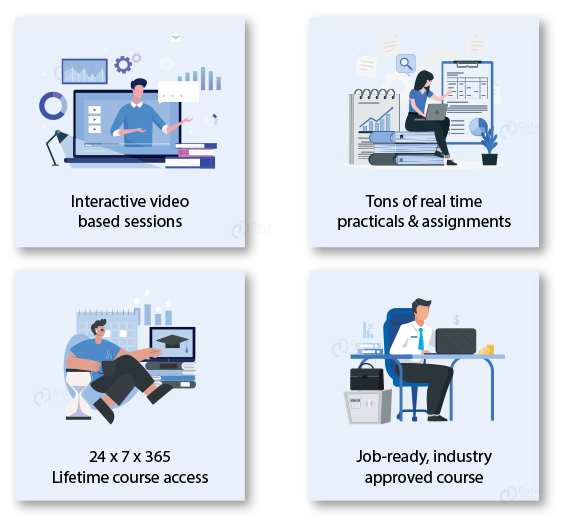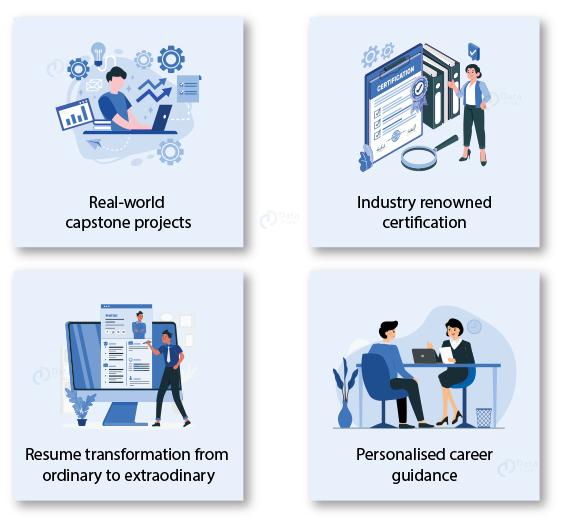Free Java Full Stack Developer Course with Certificate in Hindi
 A career as a Full Stack Java Developer offers access to a world of specialized knowledge in one of the most popular and in-demand programming languages. This Free Full Stack Java Development course offers an immersive experience that gives you the knowledge and skills to flourish in both front-end and back-end development using Java.
A career as a Full Stack Java Developer offers access to a world of specialized knowledge in one of the most popular and in-demand programming languages. This Free Full Stack Java Development course offers an immersive experience that gives you the knowledge and skills to flourish in both front-end and back-end development using Java.
What will you take home from this Free Full Stack Java Development Course?
- Self paced video-based course
- Complete study material, practicals, quizzes, projects
- Acquire practical knowledge which industry needs
- Practical Full Stack Java Development course with real-time case-studies
- Lifetime access with industry-renowned certification
Why should you enroll in this Free Full Stack Java Development course?
- Java proficiency is helpful for both front-end and back-end programming
- You gain the capacity to use Java technology to build responsive web apps
- You get the privileged knowledge of common Java frameworks and libraries
- This course provides you with expertise in database management and design
- You gain the ability to solve problems for actual web development concerns
- Hands-on experiment on the collection of projects that demonstrate your mastery of Full Stack Java
- Jobs for Full Stack Java Development are plentiful and in high demand
- Java developers with a full stack frequently command competitive pay
- Maintain your knowledge of the most recent Java technology with the help of this course
- Real-world applications and hands-on projects are examples of practical experience
- Having access to a wealth of resources Learn from pros in the field
- Rapid career advancement improves your chances for employment and career advancement
- It is renowned for its performance and stability, making it a top choice for many businesses
- A contemporary development stack Examine the most recent Java development tools and best practices
Full Stack Java Development Course Objectives
A Free Full Stack Java Development course is a thorough training program created to give people the information and abilities needed to become successful in front-end and back-end web programming using Java technology. This online Java Full Stack Development course covers a wide range of topics, starting with the fundamentals of web development, such as HTML, CSS, and JavaScript, and moving on to more advanced topics like database management, server-side programming with Java frameworks like Spring, and developing dynamic and interactive user interfaces.
Students can design, create, and deploy web applications from beginning to end by taking Full Stack Java Development courses, which frequently give students a thorough understanding of the software development process. These classes frequently place a strong emphasis on practical application and hands-on learning. The whole development stack is covered by the real-world projects that students work on, from designing the user interface to establishing databases and adding server-side functionality.
They also learn about DevOps techniques, version control, and the best ways to build web apps that are scalable, maintainable, and secure. Participants in a Free Full Stack Java Development course graduate with the skills necessary to build sophisticated, feature-rich web applications and services and are well-prepared to pursue careers in web development, software engineering, or related disciplines.
By becoming proficient in front-end technologies like HTML, CSS, and JavaScript, participants will be able to create user interfaces that are appealing and responsive. They will gain knowledge of the fundamentals of interactive web development and web design, enabling them to build websites that are both aesthetically pleasing and user-friendly. The goal of the Free Java Full Stack Development course is to provide students with a thorough understanding of JavaScript, its Document Object Model (DOM), and well-known front-end frameworks like Angular or React so they can build dynamic interfaces with plenty of features.
Participants will be equipped with these skills to turn design ideas into fully functional and engaging web pages. The goal of the online Full Stack Java Development course is to build knowledge about Java back-end development. The fundamentals of object-oriented programming will be mastered, and server-side technologies, notably Java frameworks like Spring, will be explored. Both conventional relational databases and contemporary NoSQL databases will be covered as they develop their database design and management skills.
With the help of Spring Boot, the Java Full Stack Developer course aims to give students the knowledge and abilities needed to develop reliable and effective server-side applications. Participants will gain proficiency in handling user authentication, authorization, and security through this training program, assuring the dependability and integrity of web applications. The overall goal of the Full Stack Java Development course is to produce Full Stack Java Developers who are able to plan, create, and deploy whole online solutions.
Why should you learn Full Stack Java Development?
Learning this Free Full Stack Java Development course from DataFlair will be one of the best decisions you ever made. The potential of this Java Full Stack Development course and this technology is talked about globally. Gaining these technical skills will open numerous doors of opportunities for you.
Here are some claimed facts that you should consider before learning full-stack java development-
- “Java is to JavaScript what car is to carpet.” – Chris Heilman
- “Java, the best argument for JavaScript.” – Dave Farley
- “Java is the language that can be run on any platform.” – Rees-Mogg, Jacob
- “Java is an object-oriented, class-based, high-level programming language with a dynamic changing nature.” – Keshav Singh
- “Java is to JavaScript what ham is to hamster.” – by Jeremy Keith
What is Full Stack Development?
Incorporating knowledge of both front-end and back-end technologies while utilizing the Java programming language, full stack java development takes a comprehensive approach to the creation of websites and software. The user interface, server logic, and database administration can all be created by a full-stack Java developer.
The ability to design, develop, and manage intricate, feature-rich, and fully working websites and web-based apps is made possible by the fact that they have a thorough understanding of every layer of a web application’s architecture. Developers focus on the user interface and user experience when working on the front end of a Full Stack Java application. They employ tools like HTML, CSS, and JavaScript to build responsive and interactive web pages.
Java is the main language used for the back-end, where server-side operations, databases, and ensuring the smooth running of the application are all managed. This language is frequently used in conjunction with Java-based frameworks like Spring or Hibernate. Full Stack Java Developers are highly sought-after and flexible specialists in the realm of web development since they are essential in bridging the gap between user expectations and the technical capabilities of a web application.
What to do before you begin?
Even though this course will cover each and every aspect of full stack java development, we consider it our duty to suggest some prerequisites just to make this learning journey more efficient and productive for you. Please remember that the following suggestions are not compulsory to follow-
- Having a fundamental understanding of programming concepts like variables, data types, and control structures is beneficial.
- Possessing experience with object-oriented programming is advantageous but is not strictly necessary.
- Front-end development will also benefit from having a basic understanding of web technologies like HTML, CSS, and JavaScript.
- The curiosity of problem solving and mentality to approach the solution.
Who should go for this free Full Stack Java Development course?
A wide range of people with various backgrounds and professional objectives can benefit from Full Stack Java Development training since it is inclusive and easily accessible. It gives them the adaptable abilities they need to succeed in the tech sector.
Many people who want to work in the web and software development industry may consider taking Full Stack Java Development courses.
Here are a few examples of people whose profiles suggest Full Stack Java Development training-
- Aspiring Developers
- IT Students and Graduates
- Software Development Enthusiasts
- Freelancers
- Aspiring Front-end and Back-end Developers
- Web Designing Enthusiasts
- Technical Project Managers
By enrolling in our Full Stack Java Development course, you can expect the following benefits:
Participants in a Full Stack Java Development training program set out on a thorough learning path that gives them the variety and adaptability of skill sets needed to master the craft of web development using Java technology. Participants will go deeply into the front-end and back-end development realms during their program. They’ll master the principles of HTML and CSS to properly structure and style web content, as well as developing user-friendly and aesthetically pleasing web interfaces.
A key component that will allow them to add interactivity, dynamic behavior, and responsive design to web sites is JavaScript. The study of front-end frameworks, such as Angular or React, will also help students develop user interfaces that are up-to-date and feature-rich. Participants will become fully immersed in the realm of Java programming on the back end while learning about the complexities of object-oriented programming (OOP). They will gain knowledge of how to utilize Java to create server-side applications and services, with a strong emphasis on Java frameworks like Spring that make server development effective and scalable.
Students will gain proficiency in relational and NoSQL databases, such as MongoDB and MySQL, as well as database design and management. They will learn how to use Spring Boot to build RESTful APIs, enabling them to develop robust back-end systems that communicate with front-end interfaces. Participants will leave this intense program with the knowledge and skills necessary to manage every step of the server-side development process, from data storage and retrieval to application logic, security, and optimization.
For anyone wishing to launch or expand their careers in software engineering and web development, full-stack Java development training offers a variety of advantages. Some of the main advantages are listed below-
- Full-Stack Flexibility Java developers are versatile and adaptable in a field that is changing quickly since they have expertise in both front-end and back-end functions.
- This skill set is in great demand, which opens up a variety of work prospects and brings in competitive pay.
- Training provides a comprehensive understanding by covering every step of the web development process, from creating user interfaces to maintaining servers and databases.
- Graduates can look into various areas, such as Full Stack Developer, Front-End Developer, Back-End Developer, or even project management responsibilities.
- Due to their extensive skill set, Full Stack Java Developers frequently have a wider choice of professional progression prospects.
- Entrepreneurs wishing to start their own web-based firms can benefit from the skills acquired in this training.
- From conception to deployment, full-stack developers are capable of taking charge of entire web projects.
- International work opportunities may be available due to the high demand for Full Stack Java Development abilities.
- The most recent Java technologies, frameworks, and best practices are practiced by students in a hands-on environment.
Jobs after Learning this Full Stack Java Development Course
People can pursue a variety of work prospects in the web and software development industries after passing a Full Stack Java Development course. Following are some typical job titles and career paths that you can consider after completing this course-
- Full Stack Java Developer
As the main position connected to this course, Full Stack Java Developers are in charge of both front-end and back-end development. They plan and develop online applications, maintain databases, and guarantee the efficient operation of all application components.
- Java Web Developer
With a focus on Java back-end development, Java Web Developers use server-side technologies to provide the logic and data management frameworks for web applications.
- Front-End Developer
If you have a preference for user interfaces and client-side development, becoming a front-end developer will allow you to focus on developing engaging web interfaces that leverage Java technologies in addition to HTML, CSS, and JavaScript.
- Back-End Developer
Back-end developers work on the server-side elements of web applications, albeit they are not exclusively confined to Java. They oversee the application’s fundamental operations as well as data management and server architecture.
- Software Engineer
Software engineers play a wider range of roles in the design, development, and maintenance of software programs, which can include web applications, mobile apps, and other types of software. Java development expertise on the full stack is a huge plus for this position.
- DevOps Engineer
DevOps Engineers are in charge of streamlining and automating the processes involved in creating, deploying, and maintaining web applications. The abilities needed for this profession are frequently possessed by Full Stack Developers.
- Web Application Architects
Architects who specialize in creating web applications’ overall framework and technical subsystems are known as “web application architects.” Scalability, performance, and security of the application are all ensured.
- Database Administrators (DBAs)
DBAs oversee the management and optimization of databases, preserving the accuracy and performance of the data. For database design and implementation, Java developers frequently collaborate closely with DBAs.
- Technical Consultant
Technical Consultants help their clients plan and carry out web development projects. On technology selection and best practices, they offer advice.
- UI/UX Designer
Some Full Stack Developers have a focus on the design elements of online applications, emphasizing the development of user-friendly user interfaces and guaranteeing a positive user experience.
- Entrepreneur/Startup Founder
Equipped with Full Stack Java Development skills, some people decide to launch their own web-based companies, building and maintaining their own web applications.
- Technical Project Manager
Project managers supervise the development process and make sure that projects are finished on time and on budget. In this position, having a thorough understanding of Full Stack Development may be really helpful.
Our students are working in leading organizations

Online Full Stack Java Development Free Training Course Curriculum
- Introduction to HTML, CSS, and JavaScript
- Responsive Web Design with Bootstrap
- Document Object Model (DOM) manipulation with JavaScript
- Introduction to jQuery for front-end interactivity
- Building user interfaces with AngularJS
- Introduction to AJAX and Fetch API for asynchronous data retrieval
- Consuming RESTful APIs with Java
- Front-end unit testing with tools like Jasmine
- Introduction to Java and object-oriented programming
- Building a server with Java using frameworks like Spring\
- Database design and management with SQL
- Working with relational databases (e.g., MySQL, PostgreSQL)
- Building RESTful APIs with Spring Boot
- User authentication and authorization
- Introduction to NoSQL databases (e.g., MongoDB)
- Creating and managing microservices
- Git and GitHub for version control
- Continuous Integration and Continuous Deployment (CI/CD) pipelines
- Automated testing with JUnit and TestNG
- Containerization with Docker
- Container orchestration with Kubernetes
- Server provisioning with tools like Ansible or Terraform
- Web application security best practices
- Securing APIs and data
- OAuth and OpenID Connect for authentication
- Handling security vulnerabilities and threat mitigation
- Advanced front-end development with Angular or React
- State management with Redux or NgRx
- Consuming GraphQL APIs
- Responsive design with CSS frameworks like SASS or LESS
- Advanced database management, optimization, and performance tuning
- Working with large datasets
- Data warehousing and data lakes
- Building data pipelines with Apache Kafka or RabbitMQ
- End-to-end testing with tools like Protractor
- Debugging techniques and best practices
- Performance testing and optimization
- Load balancing and clustering
- Caching strategies
- Distributed systems and microservices architecture
- Agile and Scrum methodologies for project management
- Collaborative development and agile tools
Features of Full Stack Java Development Free Course


Full Stack Java Development Online Training FAQs
Full Stack Java Development is the ability to design user-friendly and reliable web applications from the front end to the back end using Java technology.
Common technologies include SQL and NoSQL databases, HTML, CSS, JavaScript, Java, Java frameworks like Spring, and front-end libraries like Angular or React.
Stack Full With chances in software engineering, web development, and other fields, Java developers are in high demand. It’s frequently profitable to look for a job.
Although it can be useful, prior programming knowledge is not necessarily required. Beginners are catered well in our Full Stack Java Development course.
Full Stack Java Developers can make attractive incomes, frequently more than the national average, though salaries vary depending on region and experience.
Although the time frame varies, being proficient usually requires many months of committed study and practice. The development of more complex talents may take longer.
Managing complicated projects, keeping up with rapidly changing technologies, and dealing with scalability and security issues are among the difficulties.
Yes, given how quickly technology is developing, remaining current is important. It’s crucial to keep learning new things and exploring new frameworks and technologies.
From content management systems and e-commerce websites to data-driven applications and mobile apps, they can work on a variety of projects.
Yes, DataFlair provides credentials that can vouch for your proficiency in Full Stack Java Development, including the Oracle Certified Professional (OCP) designation as well as certifications from Spring or other pertinent frameworks.
